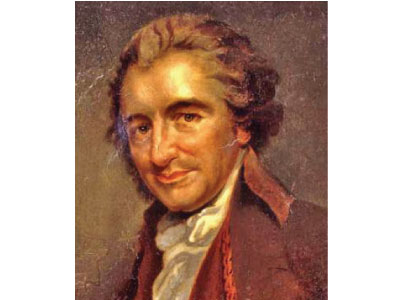
Thomas Paine (1737-1809)
THE literary force behind the American War of Independence and inspiration of the French Revolution who became a member of its government, was once a taxman in Grantham.
Thomas Paine’s days stamping the customs and excise duty mark on ale barrels at The George Hotel were more than 25 years before his classic political text, The Rights of Man, was published, which was damned by government and religious leaders alike.
Originally, he had followed his father’s occupation as a corset-maker.
He tried to run away to sea, with privateer Captain Death on his ship The Terrible (honest) but was stopped by his father.
Paine was sent to Grantham in December 1762 as £50pa county excise man. He spent 22 months here, but was sacked for ‘stamping without inspecting’
He was born in Thetford in 1737, to Frances and Joseph Pain – the ‘e’ was added when he emigrated to America.
The twice-married Quaker, may have accumulated some of his first grievances towards authority during his spell in Lincolnshire.
Paine’s first venture into literary agitation came when fellow excise men employed him to draw a up statement which reached Parliament and got him sacked.
However, while campaigning in London Paine met American statesman Benjamin Franklin, who helped him to emigrate in 1774.
He worked as a journalist in Philadelphia and was the first to coin the phrase United States of America.
Paine’s work was so influential George Washington said his 1776 pamphlet Common Sense, greatly helped the cause of American independence.
On Paine’s return to England the following year, this democratic republicanism reached its most influential expression in his two-part Rights of Man (1791-2) which sold between 100,000 and 200,000 copies in the first three years.
For Paine the French Revolution represented a much-needed new beginning, an age of reason in which universal and natural rights (at least for men) were no longer denied by privilege and the past.
Paine found both the language and the programme to attract working people to politics, underlining its relevance to their experience of economic hardship although stopped short of socialism.
Having fled to France to avoid arrest for treason in 1792, he was elected to the National Convention (government) but refused to learn French and ceased to attend after opposing the execution of Louis XVI after which he himself soon fell victim of the Terror.
During imprisonment, he began work on his Age of Reason (two parts, 1794-5), an ill-timed deist attack on organised religion.
Paine died in New York in 1809, having spent his last years in America depressed, drunk and diseased, having more than lived up to his own ideology: “He who dares not offend cannot be honest.”
Ten years later his bones were dug up and brought to England. They have since disappeared—having been saved for a national memorial which never materialised.




Leave a Reply
You must be logged in to post a comment.